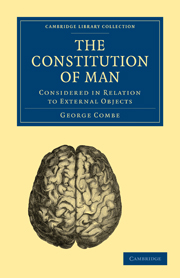Book contents
- Frontmatter
- PREFACE
- Contents
- CHAPTER I ON NATURAL LAWS
- CHAPTER II OF THE CONSTITUTION OF MAN, AND ITS RELATIONS TO EXTERNAL OBJECTS
- CHAPTER III TO WHAT EXTENT ARE THE MISERIES OF MANKIND REFERABLE TO INFRINGEMENTS OF THE LAWS OF NATURE
- CHAPTER IV ON THE COMBINED OPERATION OF THE NATURAL LAWS
- CONCLUSION
- APPENDIX
CHAPTER I - ON NATURAL LAWS
Published online by Cambridge University Press: 29 August 2010
- Frontmatter
- PREFACE
- Contents
- CHAPTER I ON NATURAL LAWS
- CHAPTER II OF THE CONSTITUTION OF MAN, AND ITS RELATIONS TO EXTERNAL OBJECTS
- CHAPTER III TO WHAT EXTENT ARE THE MISERIES OF MANKIND REFERABLE TO INFRINGEMENTS OF THE LAWS OF NATURE
- CHAPTER IV ON THE COMBINED OPERATION OF THE NATURAL LAWS
- CONCLUSION
- APPENDIX
Summary
A statement of the evidence of a great intelligent First Cause is given in the “Phrenological Journal,” and in the “System of Phrenology.” I hold this existence as capable of demonstration. By Nature, I mean the workmanship of this great Being, such as it is revealed to our minds by our senses and faculties.
In natural science, three subjects of inquiry may be distinguished. 1st, What exists? 2dly, What is the purpose or design of what exists; and, 3dly, Why was what exists designed for such uses as it evidently subserves? For example,—It is matter of fact that arctic regions and torrid zones exist, —that a certain kind of moss is most abundant in Lapland in mid-winter,—that the rein-deer feeds on it, and enjoys high health and vigour in situations where most other animals would die; further, it is matter of fact that camels exist in Africa,— that they have broad hooves, and stomachs fitted to retain water for a length of time, and that they flourish amid arid tracts of sand, where the reindeer would not live for a day. All this falls under the inquiry, What exists? But, in contemplating the foregoing facts, it is impossible not to infer that one object of the Lapland moss is to feed the reindeer, and one purpose of the deer is to assist man : and that, in like manner, broad feet have been given to the camel to enable it to walk on sand, and a retentive stomach to fit it for arid places in which water is not found except at wide intervals.
- Type
- Chapter
- Information
- The Constitution of ManConsidered in Relation to External Objects, pp. 1 - 22Publisher: Cambridge University PressPrint publication year: 2009First published in: 1828

